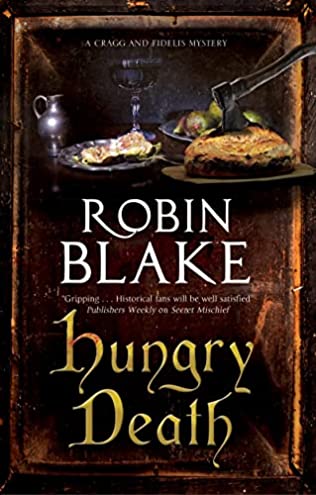
I have become a huge fan of the Cragg and Fidelis books written by Preston-born Robin Blake. They are set in the 1740s in Lancashire, Titus Cragg is the county coroner, and his friend Luke Fidelis is an enterprising and innovative young physician. Hungry Death is the eighth in this excellent series, and to read my reviews of three of the previous books Skin and Bone, Rough Music, and Secret Mischief, click the links.
 Cragg is instructed to ride out to a lonely moorland farmhouse, and what he finds surpasses any of the previous horrors his calling requires him to confront. He finds an entire family slaughtered, by whose hand he knows not, unless it was the husband of the house, himself hanging by a strap hooked over a beam. To add even more mystery to the grisly tableau, Cragg learns that the KIdd family were members of a bizarre dissenting cult which encourages its members into acts of brazen sexuality. Then, in a seemingly unconnected incident, the gardener at a nearby mansion, trying to improve the drainage under his hothouse, discovers another body. This corpse may have been in the ground for centuries, as it has been partly preserved by the peat in which it was buried. When Fidelis conducts an autopsy, however, he concludes that the body is that of a young woman, and was probably put in the ground within the last decade or so.
Cragg is instructed to ride out to a lonely moorland farmhouse, and what he finds surpasses any of the previous horrors his calling requires him to confront. He finds an entire family slaughtered, by whose hand he knows not, unless it was the husband of the house, himself hanging by a strap hooked over a beam. To add even more mystery to the grisly tableau, Cragg learns that the KIdd family were members of a bizarre dissenting cult which encourages its members into acts of brazen sexuality. Then, in a seemingly unconnected incident, the gardener at a nearby mansion, trying to improve the drainage under his hothouse, discovers another body. This corpse may have been in the ground for centuries, as it has been partly preserved by the peat in which it was buried. When Fidelis conducts an autopsy, however, he concludes that the body is that of a young woman, and was probably put in the ground within the last decade or so.
Bodies – dead ones – are central to Titus Cragg’s world. A coroner, then and now, must try to be led, hand in hand, by the dead until the circumstances of their demise is revealed. Sometimes, through his investigations and observations, Cragg (helped by the medical eye of Fidelis) can make the dead talk, but the peat-blackened young woman seems to have little to say. Painstaking and shrewd deduction leads Cragg to believe that she was a servant girl once employed at one of the large households in the area. But who? The girls came and went, changed their names through marriage, and the passing years have cast a shroud of fog over the matter.

Regarding the slaughter at the farmhouse, Cragg discovers that the answer lies in the peculiar – and vengeful – nature of the Eatanswillian sect. I believe Robin Blake has used a little historical license here, as the only mention of the word online that I could find is that of the election in the fictional town of Eatanswill (described so satirically in The Pickwick Papers). The resolution of the case hinges on a note pinned to the door of the farmhouse, apparently written in some kind of code. Cragg hopes that deciphering the code will lead him to the perpetrator of the slaughter.
All is resolved, of course, in the final pages, which are framed around the coroner’s inquest into both cases, and Robin Blake gives us a courtroom drama worthy of anything in the distinguished career of Perry Mason or, more recently Micky Haller. This is a cracking piece of historical crime fiction from the first word to the last, but I have to say the opening chapter was one of the most horrific passages I have read for a long time. Hungry Death is published by Severn House and is available now.











Leave a comment